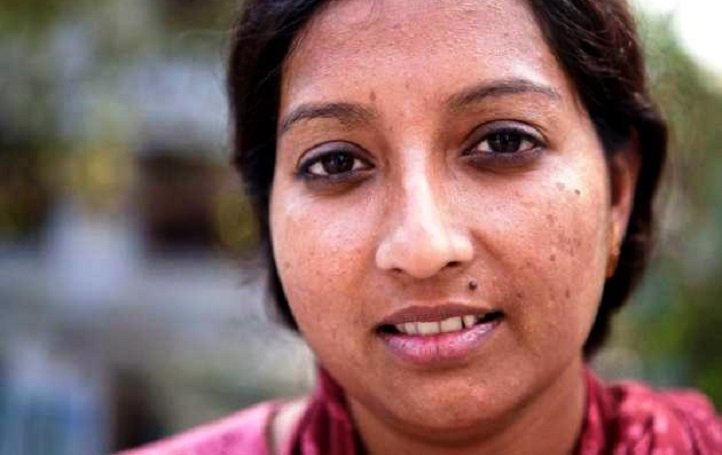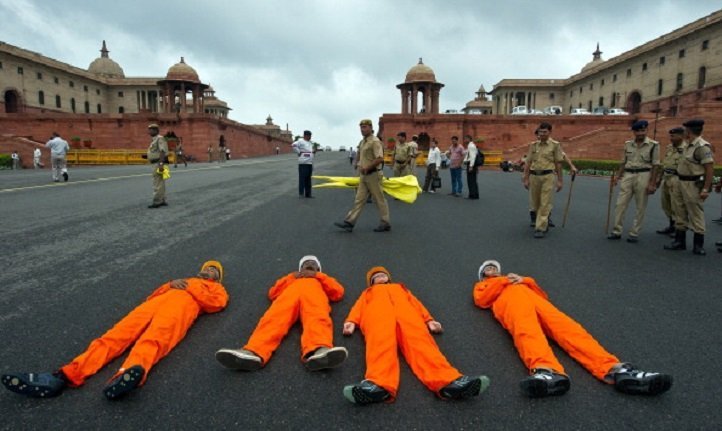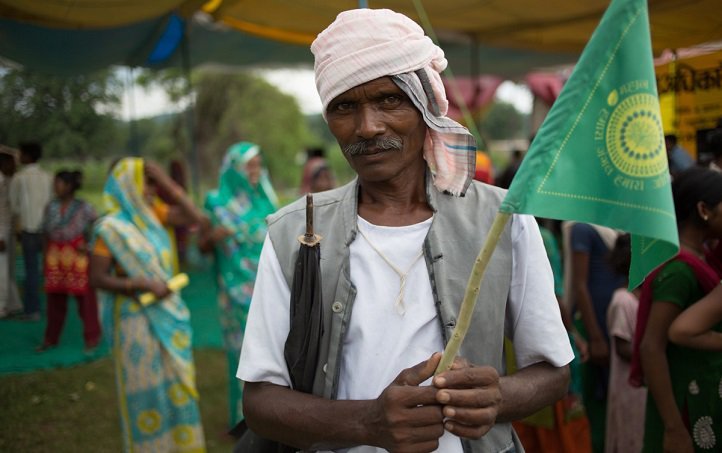Pro-environment NGO Greenpeace International has called the Indian government’s action against Greenpeace India a “harassment campaign”. The government on Thursday, April 9 suspended the Indian branch’s Foreign Currency Regulation Act (FCRA) registration under which it receives funds from abroad.
The government also issued a show-cause notice to Greenpeace India asking why its registration should not be terminated.
Greenpeace International told Economic Times that sections of the Modi government, “mainly the Ministry of Home Affairs (MHA), has been running against Greenpeace India. This latest move appears to be more of the same and is clearly an attempt to suppress the voice of Indians demanding their legal and constitutional rights to clean air, safe food and a healthy and livable environment.”
Samit Aich, the Executive Direction of Greenpeace India called it a “smear” on the part of the government. “All of this was put before the Delhi High Court when we brought a case against the Centre, and the court decided in our favour.”
“We believe in the Indian legal system. A campaign is being waged against dissent, but we will not be cowed,” he added.
On @HeadlinesToday , our Exec Dir @SamitAich : “As an org, we follow all laws of the land. What we’re doing is not unconstitutional.”
— Greenpeace India (@greenpeaceindia) April 10, 2015 So, what really happened here? Let’s do a recap.
On January 11, Greenpeace campaigner Priya Pillai was offloaded from a flight headed for London. Pillai was to speak before British parliamentarians about alleged violation of laws at Mahan coal project in Madhya Pradesh. Her name was on a government database that barred her from leaving India.
“I was told by the immigration officer that I couldn’t fly out of the country, even though I had a valid six-month visa. When I asked him why, he refused to give me a reason. Upon insisting, he took me to his senior officer, who in turn told me that I was on a database issued by the Government of India of individuals who can’t fly out of the country,” Pillai said, The Indian Express reports.

Priya Pillai | Source: Beyond Headlines
How did her name reach the ‘blacklist’?
Soon after the incident, it was revealed that the Intelligence Bureau (IB) used the “etc” category in an internal order of the MHA to issue the database that stopped her from flying out.
This was done as there was no criminal case against Pillai, officials said, The Indian Express reports.
“Pillai took legal action on breach of personal liberty grounds against the move, which the environmental campaign group described as ‘bullying’ by the government,” The Guardian reports.
Delhi High Court intervenes
On January 28, the Delhi High Court asked the government to explain why it had barred Pillai, who held a valid visa, from flying out of New Delhi.
The HC had previously directed the government to unfreeze an IDBI account of Greenpeace India that the state had frozen. The account held foreign contribution amounting to Rs 1.87 crore from Greenpeace International. The court observed that the government had not brought any ‘evidence on record’ to support its action of freezing the account.
“First you freeze the account then you investigate the case, which is very, very uncommon,” observed the court, The Indian Express reports.
“NGOs are entitled to have their viewpoints,” said the court, adding that the NGO cannot be accused of acting against national interest “merely because its views do not match the government’s viewpoint”.
Meanwhile, in Delhi
In February, shortly after Arvind Kejriwal’s AAP government came into power in Delhi, Greenpeace India released an alarming survey regarding the pollution levels of Delhi. The survey found that the deadly PM2.5 levels (Particulate Matter 2.5 micrometers in size) in the national capital were 10 times higher than the safety limit prescribed by the World Health Organisation, DNA reports.
“Greenpeace said the annual PM2.5 averages of Delhi were higher than that of Beijing, and this winter Delhiites witnessed several bad-air days with the Air Quality Index averaging at critical pollution levels,” the report reads.

Government’s shocker
The Union government, in February, told the Delhi High Court that they will withdraw the Look Out Circular (LOC) issued against Greenpeace India activist Priya Pillai as long as she does not ’embarrass India’, Firstpost reports.
The government claimed that Pillai was offloaded from her flight to London as her proposed ‘testimony’ would have been ‘prejudicial’ to India’s interests and that the move “was focused only on the proposed activity of her deposing before a foreign parliament”.
“We have ample evidence, it’s not like we are talking baselessly and ridiculously, why should we stop talking about violations? I refuse to be gagged. This is totally unacceptable. As a citizen of this country, I have the right to express my opinion peacefully,” Pillai had said.
Piling onto the govt’s comment, Additional Solicitor General Sanjay Jain drew an analogy to ” doodh mein makkhi (fly in the milk)” to argue that the situation had “potential for mischief” against India’s economic interests, The Indian Express reports.
Our Executive Director . @SamitAich on @ibnlive : “Govt should look at NGOs as partners and not as adversaries.” #Greenpeace
— Greenpeace India (@greenpeaceindia) April 9, 2015 Pillai rejects ‘offer’
Priya Pillai chose to reject the government’s offer and refused to agree with the undertaking to not ’embarrass’ the country.
“The government decision is not appropriate as there are many people who indulged in various anti-national activities but were traveling abroad,” Justice Rajiv Shakdher said during a hearing that saw heated exchanges between the Additional Solicitor General and the senior lawyers representing Pillai, The Times of India reports.
The court further noted that “this is not the first instance where such an event is going to take place. We have to be careful with our decision or else the same will bite us one day. There will be protest or agitation before the coming up of projects in India but the same are settled as time passes.”
Ban on Greenpeace activists’ visit
In February, it was revealed that the government had banned 13 foreign Greenpeace International activists from entering India. Nine of these activists were from UK, three from USA and one from Australia.
“These activists have been blacklisted as their activities were found to be in violation of visa rules and they were found to be training, motivating and organising Greenpeace India’s activists to create field level protests near thermal plant and coal mine locations, apart from other activities that would damage India’s energy security interests, MHA told the Delhi High Court,” The New Indian Express reports.
Priya’s victory
On March 12, the Delhi High Court revoked the LOC against Pillai terming it illegal.
Justice Rajiv Shakdher, while upholding Pillai’s right to travel abroad, also said that she had every right to hold a different opinion on development policies and this could not be the sole ground to restrict her movement, The New Indian Express reports.
“There was no basis for the government to issue a lookout circular against her. The decision taken to detain her at the airport on January 11 in my opinion, was illegal being violative of [the] Pillai’s right under Article 21 and 19(1)(a) of the Constitution,” the judge added.

Greenpeace questions Modi’s National Air Quality Index
“We welcome the launch of the National Air Quality Index but given the scale of air pollution and the impact it has on the public in Delhi and many other cities across the country, we had expected the Government to address the issue with more rigor and responsibility,” the NGO stated.
“Delhi is facing a public health emergency and an Air Quality Index needs to be matched with actionable plans on how to bring the pollution levels down, at the very least with a health advisory,” added the statement, DNA reports.
MHA blocks Greenpeace again
On April 7, The Indian Express reported that the Ministry of Home Affairs has put at least 14 foreign donors under the “prior approval” category.
“A senior government official said the 14 foreign donors were placed under this category amid allegations that the funds sent by them were being used for ‘anti-India’ activities and they had also diverted funds to Greenpeace India,” the report states.
Fast-forward to now
Now that you know the story so far, you must also know that the MHA claims that Greenpeace India has “pre-judicially affected the economic interest of the state.”
“In recent months, the group has mounted a massive protest to block coal mining project in central India, even as the government is trying [to] kickstart a number of stalled industrial projects across the country. A secret intelligence agency note, leaked to the local media last year, had called the group’s activities a threat to ‘national economic security’,” The Washington Post reports.
Greenpeace India claims that nearly 70 per cent of its funding comes from tens of thousands of Indian donors.

















